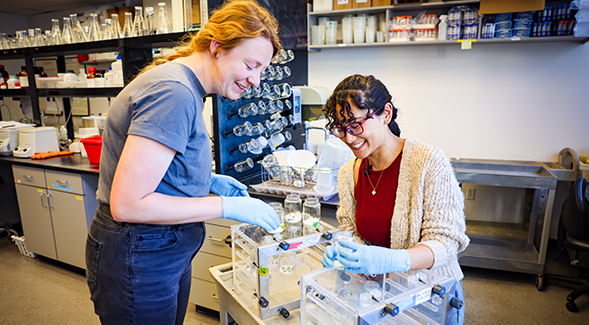Rising to $192.2M, SDSU Earns Record-Breaking Research Funding for Second Year in a Row
368 researchers garnered 805 awards from 331 funding sources

With impactful work to reduce health disparities, empower climate justice advocates and preserve cultural artifacts and traditions, San Diego State University researchers secured a record $192.2 million in funding in 2022-23.
The awards represent a 17% increase over the previous fiscal year, a second straight rise, with federal funding sources that include the National Institutes of Health (NIH), the Environmental Protection Agency and the Department of Defense.
“This is an incredible milestone,” said Hala Madanat, SDSU’s vice president for research and innovation. “Our steady year-over-year growth demonstrates our researchers’ exceptional ingenuity in their solutions to today’s most pressing challenges.”
Last year, SDSU secured $164.5 million in grant funding, a then-record that broke the university's previous high of $148.6 million in 2019.
2022-23’s record-setting research activity is one piece of the equation for achieving SDSU's goal of becoming a premier public research university and joining the 4% of U.S. universities designated as "R1" in the prestigious Carnegie Classification of Institutions of Higher Education. An "R1" status would likely enable further investment in the university from public and private funding sources while enhancing existing regional economic and workforce development efforts.
SDSU is currently classified as "R2" for "high research activity," and was most recently ranked in the top 20 for research expenditures among Hispanic Serving Institutions in a survey by the National Science Foundation.
Some 368 principal investigators received 805 awards from more than 300 local, state and federal agencies as well as non-profit foundations and for-profit companies. Researchers were busy working to secure further support, submitting more proposals for research-related funding than ever before.
Funding during the 2022-23 fiscal year supported research into detecting pollutants, expanding youth mental health services, preventing flooding, streamlining artificial intelligence algorithms, understanding autism across the lifespan, and increasing inclusivity in classrooms, media, and workplaces.
The NIH continued to be one of the greatest sources of support, with a record $41 million in funding for public health and biomedical research. Some $32.5 million was directly awarded to SDSU and an additional $8.5 million was supplied through partnerships with other universities and organizations.
SDSU researchers secured more funding than ever before from the EPA as well, reflecting the university’s commitment to sustainability and clean energy. The EPA supplied SDSU a total of $4.5 million in 2022-23, with an additional $6 million scheduled for the next few years. More than $1.2 million from the Department of Energy will go toward environmental projects such as evaluating contaminated brownfield sites, monitoring water quality in the heavily polluted Tijuana River, and optimizing companies’ energy usage.
Department of Defense agencies funded projects totaling more than $11.2 million, more than double of the previous year. Projects include data science modeling of atmospheric conditions, habitat restoration on San Clemente Island, language training and 3D-printed materials.
Expanding Inclusion and Innovation
Funding for Hispanic Serving Institution-specific initiatives such as involving students in research on drones, studying genetics of beer ingredients, and training more bilingual teachers increased to a record-high $10.4 million.
“I'm thrilled that SDSURF, now in its 80th year, continues to support SDSU faculty in their pursuit of increased research funding. Our team is dedicated to furthering research activities and proud to help advance the university's initiatives,” said Michèle Goetz, associate vice president and chief executive officer of the San Diego State University Research Foundation (SDSURF).
SDSU Georgia received funding to continue training a much-needed STEM workforce and study drug-resistant bacteria. With an additional $4.2 million, SDSU faculty will expand their expertise in early childhood education and entrepreneurship to the region.
Imperial County’s Department of Social Services invested heavily in SDSU Imperial Valley to train additional health care workers in the latest technologies and most inclusive practices.
Industry-leading initiatives slated to occupy space at the SDSU Mission Valley Innovation District, such as Techstars San Diego Powered by SDSU and the newly formed SDSU Center for Community Energy and Environmental Justice to empower climate justice advocates, also received an influx of funding.
Faculty innovation reached new heights, also. They submitted 35 new intellectual property disclosures, contributed as inventors to nearly 40 new patent applications, and were issued 10 new patents. Royalties revenue from previously patented technologies grew 38% from the previous year to nearly $900,000.
Compounding Successes
SDSU’s growth in research funding addresses the university’s drive, outlined in a five-year strategic plan now well past its midpoint, to achieve designation as a premier public research university. It also reflects the payoff of the university’s investment in collaborative discovery.
Several of the Big Ideas project teams, spearheaded by SDSU President Adela de la Torre and Karen May-Newman, executive director of STEM teaching, learning and innovation, earned just under $8 million in funding for their trans-disciplinary approaches to environmental justice, sustainable materials and water quality.
A cohort of faculty recently hired to further strengthen the university’s health disparities research is already producing results and cementing relationships with health care partners that include Scripps Research Translational Institute, Moores Cancer Center at UC San Diego Health, and the Women, Infants and Children (WIC) programs. Collectively, they have secured more than $8.5 million in funding for research on air pollution, nutrition, cancer care, and Alzheimer’s in Latino populations.
The historic high of more than $7.1 million in funding from the U.S. Department of Agriculture was awarded to faculty collaborating across the College of Arts and Letters, the College of Sciences, and the College of Health and Human Services.
The primary aim is to train binational students in Indigenous agricultural practices. The outcomes of their projects will not only preserve these valued traditions and prepare students for emerging careers but also strengthen research relationships with the SDSU Oaxaca Center for Mesoamerican Studies and food sold at university venues, including Snapdragon Stadium.



